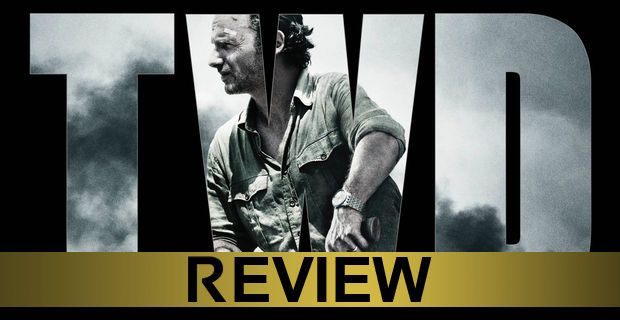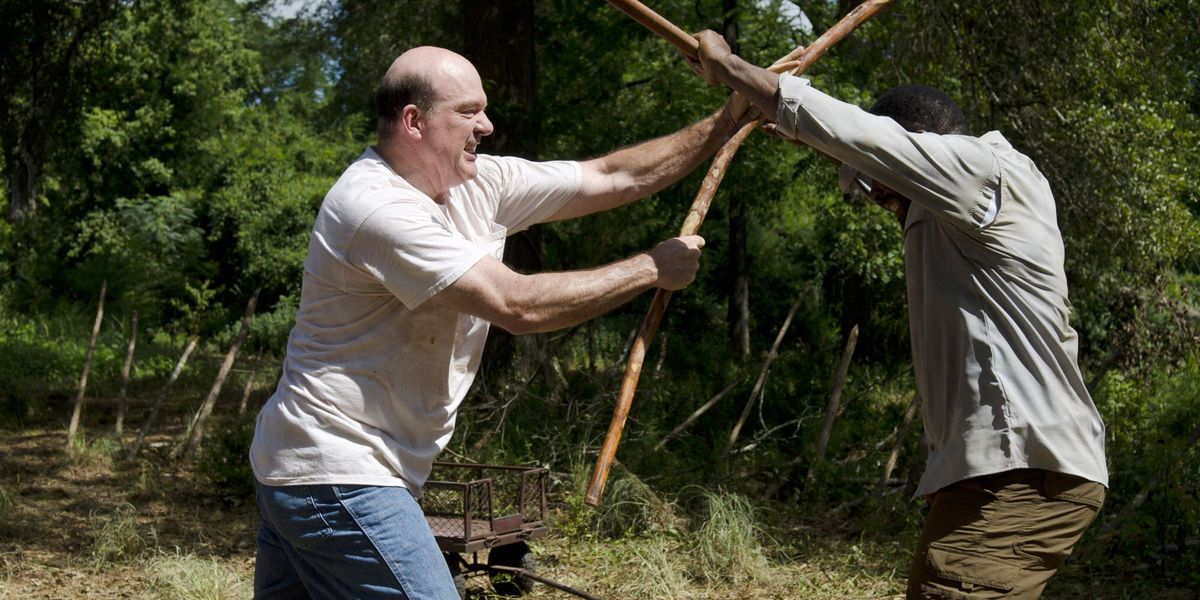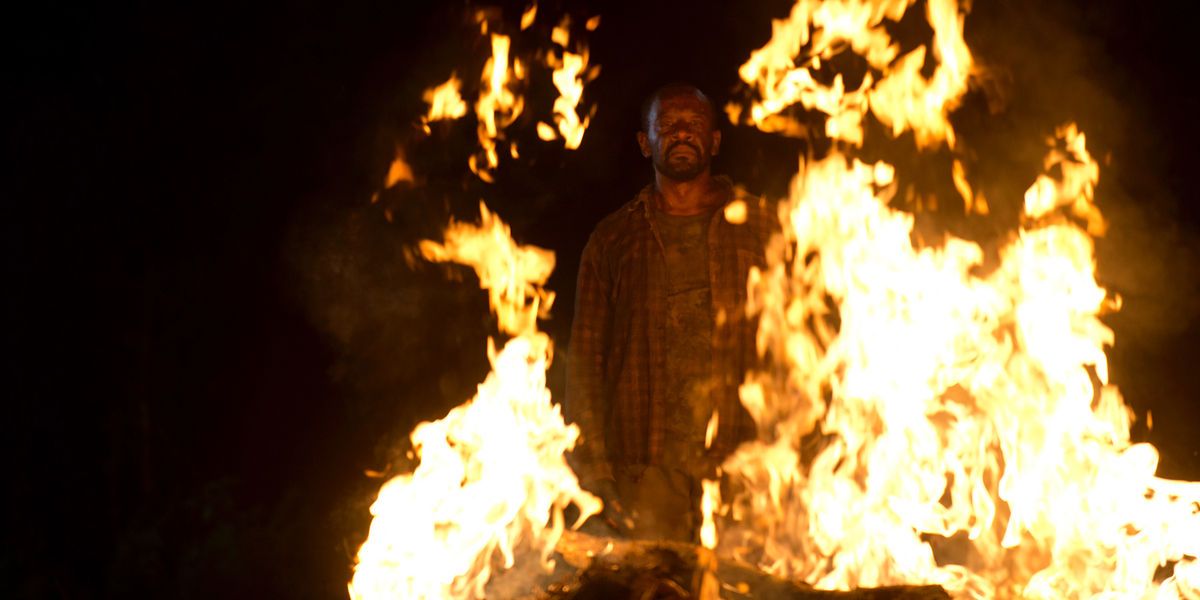[This is a review of The Walking Dead season 6, episode 4. There will be SPOILERS.]
-
Back in season 3, The Walking Dead introduced 'Clear,' an episode that demonstrated the show had another gear beyond hopeless nihilism, violence, and endless bickering between characters with nothing much to talk to one another about. Written by soon-to-be showrunner Scott Gimple, it was, at the time, the best episode the series had ever produced outside of the series premiere. A contemplative character study, and bottle episode, 'Clear' brought back Lennie James' Morgan character to offer Rick a little perspective on his current state of affairs and to generally crack a window and let some air into what had become a stuffy, claustrophobic season.
Now that James is back and finally a full member of the cast, it makes sense for Gimple to want to dive into the character he clearly has a knack writing for, to offer some insight into where he's been and how a violent man at the end of his rope could turn into the monk-like warrior who values all life that he is now. Earlier this year, at SDCC, Gimple stated that he and James had every intention of revisiting Morgan's recent past, and would ostensibly connect the dots with the character, if for nothing else than to make up for lost time, as it has taken too long to get James on board as a regular member of the cast.
And yet, even while 'Here's Not Here' easily marks itself as one of the best entries of this season and, possibly, the entire series, a serious question lingers as to the efficacy of airing the episode right after last week's uncharacteristically ambiguous death. No doubt, after a week of waiting, viewers were clamoring to get some sort of confirmation either way on the status of Glenn Rhee. Whether he did in fact become zombie chow, or inexplicably managed to drag himself out and become whatever it is Dave Alpert mentioned in his postmortem interview – here's hoping he becomes the show's version of Negan, and will henceforth be known as NeGlenn (that's a joke for those sharpening their pitchforks) – it seems like an odd choice to move from a question of Glenn's survival and Rick being beset by walkers to an introspective 90-minutes on the value of life in the post-apocalyptic world.
Still, it also seems like the show has written itself into a no-win situation with Glenn either way, so perhaps delaying it for another week (at least) to focus on such a strong episode may have been the right choice. After all, if the Glenn death/survival ends up being as divisive as it feels like it might, it is likely better to give James his showcase now, rather than when the flames of fan passion and/or ire are burning their hottest. Besides, given that season 6 has been vacillating between Rick organizing an unruly zombie marathon and the Wolves storming Alexandria, there is some sense – or at least consistency – in seeing the action turned back to Alexandria (technically), as Morgan regales a homicidal lone Wolf with his tale of woe and recovery thanks to the kindness, patience, and tutelage of Eastman, played by the wonderful character actor John Carroll Lynch.
Though he sometimes plays father figures or other positions of authority, Lynch is most well known (or perhaps best suited) for portraying intimidating characters of another kind – those who are prone to horrific acts of violence. He was the likely titular killer in David Fincher's superlative Zodiac and he again took up the homicidal act as Twisty the Clown and John Wayne Gacy in American Horror Story: Freak Show and Hotel, respectively. In that regard, casting him as the peaceful, goat cheese-making aikido master (relatively speaking, given the state of the world and the ostensible lack of aikido masters) Eastman is sort of a stroke of genius. It is doubly so, considering the underlying idea of the episode has to do with finding value in and respecting all life, even in (or especially in) the zombie apocalypse.
It might seem like a sharp, uncharacteristic turn for a series with a penchant for gory violence and nihilism to explore the notion of spiritual rehabilitation and non-violence (as much as such a thing can be practiced in this particular world), but the stark dichotomy between almost any episode, really, and 'Here's Not Here' is actually well within The Walking Dead's and Gimple's wheelhouse. The series works primarily on a strict binary. That is, characters are frequently pitted against those with a directly oppositional stance. It's a hallmark of Robert Kirkman's writing, and one that has unsurprisingly found its way into the DNA of the series. This time, it just takes that binary a step further, first by pitting the feral Morgan against the serene Eastman, and then by flipping the script on the series itself, from dark, violent, solemnity, to one of spiritual renewal and hope.
The episode works because, as mentioned above, Gimple seems to have a special kind of rapport not only with James, but also with his fictional counterpart. Additionally, it's just great to see James and Lynch acting against one another, especially in a series of scenes that are seemingly in no hurry to get anywhere in terms of servicing the overarching plot of the season, as is the benefit of doing a one-off backstory like this. The 90 minutes are allowed to sit and think and just be with the characters in some moments that are interesting beyond questions of their immediate survival. The opening minutes felt like The Walking Dead was going to do its version of Cast Away, with James chatting away his loneliness with his trusty spear – let's call it Frank Agnew – until he finally found a way to prove he was not a bad man, and to save himself.
Of course, things turned out differently and for the better, but it's still difficult not to see the stark binary Eastman left Morgan with, one that doesn't quite fit the world outside his quaint and relatively untouched cabin. While it's easy to isolate the shortcomings in Eastman's worldview – the show has argued before that killing for revenge is different than killing to survive or to save others – the shortcomings of his and Morgan's no-kill position actually offer a necessary wrinkle in what would otherwise be another stark binary of kill or don't kill. While Morgan secretly keeps one of the Wolves locked away in an Alexandria home, apparently hoping to rehabilitate him as he once was, there is a chance for the show to explore the middle ground, the gray area between Morgan's ethos and, say, that of Rick or Carol.
All this doesn't change the fact that 'Here's Not Here' felt deliberately like a cheeky delay on confirmation of Glenn's status (Steven Yeun was not listed in the opening credits, for what that's worth), which is only worsened by how discussion of the character's fate was handled immediately after the fact. But, at the same time, that delay – mischievous or not – actually made this terrific episode stand out all the more.
-
The Walking Dead continues next Sunday with 'Now' @9pm on AMC. Check out a sneak peek below:
Photos: Gene Page/AMC



